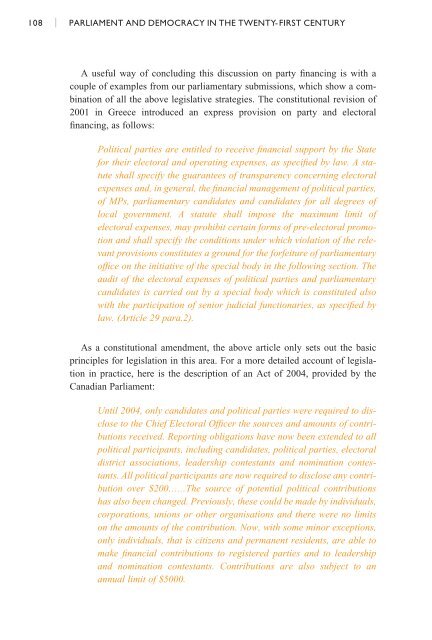PARLIAMENT AND DEMOCRACY - Inter-Parliamentary Union
PARLIAMENT AND DEMOCRACY - Inter-Parliamentary Union
PARLIAMENT AND DEMOCRACY - Inter-Parliamentary Union
You also want an ePaper? Increase the reach of your titles
YUMPU automatically turns print PDFs into web optimized ePapers that Google loves.
108 I <strong>PARLIAMENT</strong> <strong>AND</strong> <strong>DEMOCRACY</strong> IN THE TWENTY-FIRST CENTURY<br />
A useful way of concluding this discussion on party financing is with a<br />
couple of examples from our parliamentary submissions, which show a combination<br />
of all the above legislative strategies. The constitutional revision of<br />
2001 in Greece introduced an express provision on party and electoral<br />
financing, as follows:<br />
Political parties are entitled to receive financial support by the State<br />
for their electoral and operating expenses, as specified by law. A statute<br />
shall specify the guarantees of transparency concerning electoral<br />
expenses and, in general, the financial management of political parties,<br />
of MPs, parliamentary candidates and candidates for all degrees of<br />
local government. A statute shall impose the maximum limit of<br />
electoral expenses, may prohibit certain forms of pre-electoral promotion<br />
and shall specify the conditions under which violation of the relevant<br />
provisions constitutes a ground for the forfeiture of parliamentary<br />
office on the initiative of the special body in the following section. The<br />
audit of the electoral expenses of political parties and parliamentary<br />
candidates is carried out by a special body which is constituted also<br />
with the participation of senior judicial functionaries, as specified by<br />
law. (Article 29 para.2).<br />
As a constitutional amendment, the above article only sets out the basic<br />
principles for legislation in this area. For a more detailed account of legislation<br />
in practice, here is the description of an Act of 2004, provided by the<br />
Canadian Parliament:<br />
Until 2004, only candidates and political parties were required to disclose<br />
to the Chief Electoral Officer the sources and amounts of contributions<br />
received. Reporting obligations have now been extended to all<br />
political participants, including candidates, political parties, electoral<br />
district associations, leadership contestants and nomination contestants.<br />
All political participants are now required to disclose any contribution<br />
over $200……The source of potential political contributions<br />
has also been changed. Previously, these could be made by individuals,<br />
corporations, unions or other organisations and there were no limits<br />
on the amounts of the contribution. Now, with some minor exceptions,<br />
only individuals, that is citizens and permanent residents, are able to<br />
make financial contributions to registered parties and to leadership<br />
and nomination contestants. Contributions are also subject to an<br />
annual limit of $5000.

















